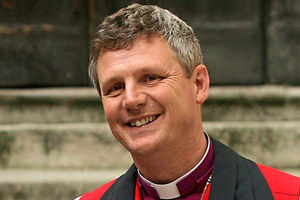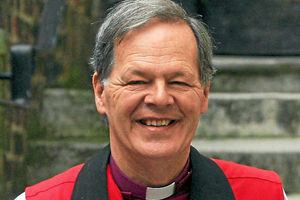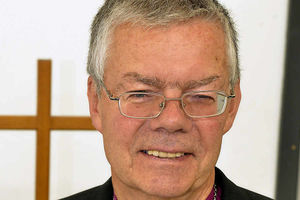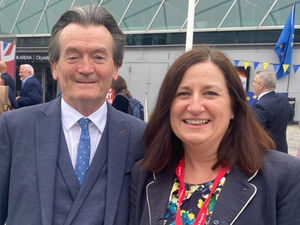Bishops' Easter messages as 2,000-year-old miracle recalled
Religious leaders focus on a weekend starting with the pain and sadness of the crucifixion followed by joy and optimism of the resurrection on Easter Sunday.
Mark Rylands - Anglican Bishop of Shrewsbury:

Ian Botham, Man Utd or Jesus Christ? Who made the greatest comeback?
In the Headingley Test Match of 1981, stripped of the captaincy, Botham bats with amazing belief and confidence to score 149 Not Out and scupper the Aussies after England looked dead and buried. In 1999, Man Utd, 1-0 down after 90 minutes, come back to score two goals against Bayern Munich in injury time and win the Champions League Final. Jesus of Nazareth, 33 AD, crucified on the Friday and buried in a tomb; but then seen up and about on Sunday, walking, talking and eating. Which is the greatest comeback?
Actually, it was Roger's phone call that reminded me of the miracle of Easter. Ten years ago, Roger and I were watching the Champions league Final on TV – Liverpool versus AC Milan in Istanbul. We watched the first half only and saw Liverpool being completely overrun by the Italian team. At half time they were 3–0 down. Some Liverpool supporters left the ground. It looked like game over, so we switched off and went into the kitchen for supper.
Two thousand years ago there was a similar reaction on that first Good Friday. Jesus was crucified. For the disciples, the one, whom they had spent three years following, had failed. The one, whom they thought would change the world, was killed. As far as they were concerned it was all over. The dream was ended. So they went back home; heads down; defeated.
But it wasn't the end. Sometimes you just need a bit of faith.
In that Champions League Final, Liverpool came back from 3-0 down to win on penalties after extra time. When Roger and I turned the TV back on we couldn't believe it! It was an extraordinary victory: one of the greatest comebacks of all time. But not the greatest.
That was made by Jesus of Nazareth. During Holy Week and Easter we remember how Jesus was arrested, sentenced to death and crucified. On the cross, the aliveness of Jesus Christ went down under the deadness that is our sickness and sin. Surrendering himself to death, he drew it into himself and absorbed it. Our sin was absorbed in Christ's forgiveness. Jesus has opened up a way for us. He transformed death into life on Easter Day. Dead on Friday; alive on Sunday. He burst out of the tomb to make the biggest comeback.
So whatever your situation; however bad it may seem; do not give in. There is hope. That is the message of Easter – love is stronger than hate, good will defeat evil and life will overcome death. The comeback King's promises are for everyone. He came back to bring us home.
++++
The Right Reverend Jonathan Gledhill - Bishop of Lichfield:

Each generation has only to stop believing and that will be the end of the Church.
Over and over again, for many centuries, people have predicted that Christianity will fade away; often in places like Romania and Communist China they've tried to give it a helping hand to disappear.
In Western Europe, the Church has weakened.
But in the rest of the world, more people have become Christians in our generation than in any generation since the Resurrection.
And even here, month by month, I hear the stories of adults who have recently come to find the faith and have discovered for themselves that Jesus Christ is not just a figure in the history books but someone we can relate to, who can guide us and help us, because he is not dead but alive.
Here is a typical example, someone I met recently: "I was always very sceptical and wouldn't believe anything that couldn't be proved.
"I start coming to church just to please my wife.
"Once there was a speaker from Africa, a quiet man but a powerful one.
"I felt God nudging me.
"Gradually it came to me that unless all these people in church that I had come to respect were just frauds this stuff was real.
"There came the moment when I felt compelled to make my own commitment to the Lord, and that is exactly what I did.
"I am still asking questions but now I know that there is a power greater than anything I had ever experienced and beyond my comprehension.
"Which is why I have decided to be confirmed."
This man couldn't believe, but then the stone was rolled away in his comprehension and he found himself first investigating and then believing that Christ was risen and that he could find new life in him.
All of us are somewhere in our relationship with God.
Somewhere on the scale from denial, through apathy, to curiosity, to interest, to discovery.
Wherever we are, God is interested in us.
And his resurrection power is available to us and to our lives too.
++++
Richard Frith, Bishop of Hereford:

The evidence for the resurrection of Jesus is compelling – the empty tomb, the appearance of Jesus to his disciples and others, the transformation against all the odds of the bewildered, downcast and utterly defeated group of disciples to those who were to go out and share Christian good news across the world.
But however compelling it might be, the evidence for the resurrection of Jesus can itself lead to a "so what?", "whatever" kind of reaction.
On the first Easter Day, the turning point of understanding came for Mary Magdalene when Jesus called her by name.
She thought he was the gardener.
"Mary," said Jesus, and then came the moment of recognition.
Easter is about life, new life, about Jesus risen from the dead, giving us hope when things feel hopeless, courage when we want to run away, strength to be open and vulnerable, confidence in the face of death. When things are at their worst, God acts. When things are dark, when human possibilities are exhausted – God acts; new life dawns.
That was Mary's experience, that can be ours too.
A school inspector was looking at children's work in the classroom. At the back of one little girl's book, he found a small masterpiece.
"What a wonderful poem," he said.
"They're my spelling corrections," replied the girl.
Spelling corrections or not, they spelt out words for Easter.
They read:
Yesterday, yesterday, yesterday
Sorrow, sorrow, sorrow
Today, today, today
Hope, hope, hope
Tomorrow, tomorrow, tomorrow
Love, love, love
Yes, Christ is risen.
A very happy Easter.





